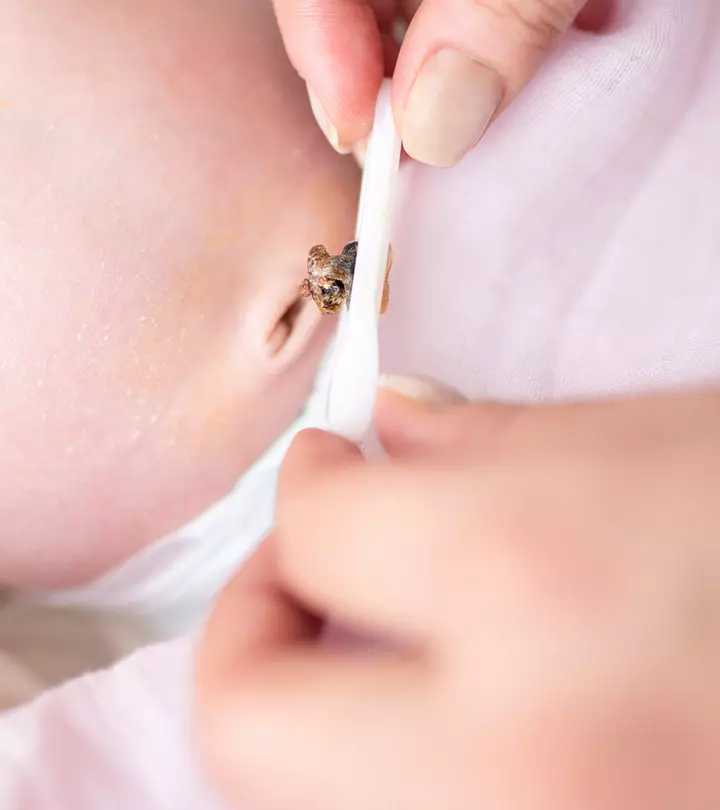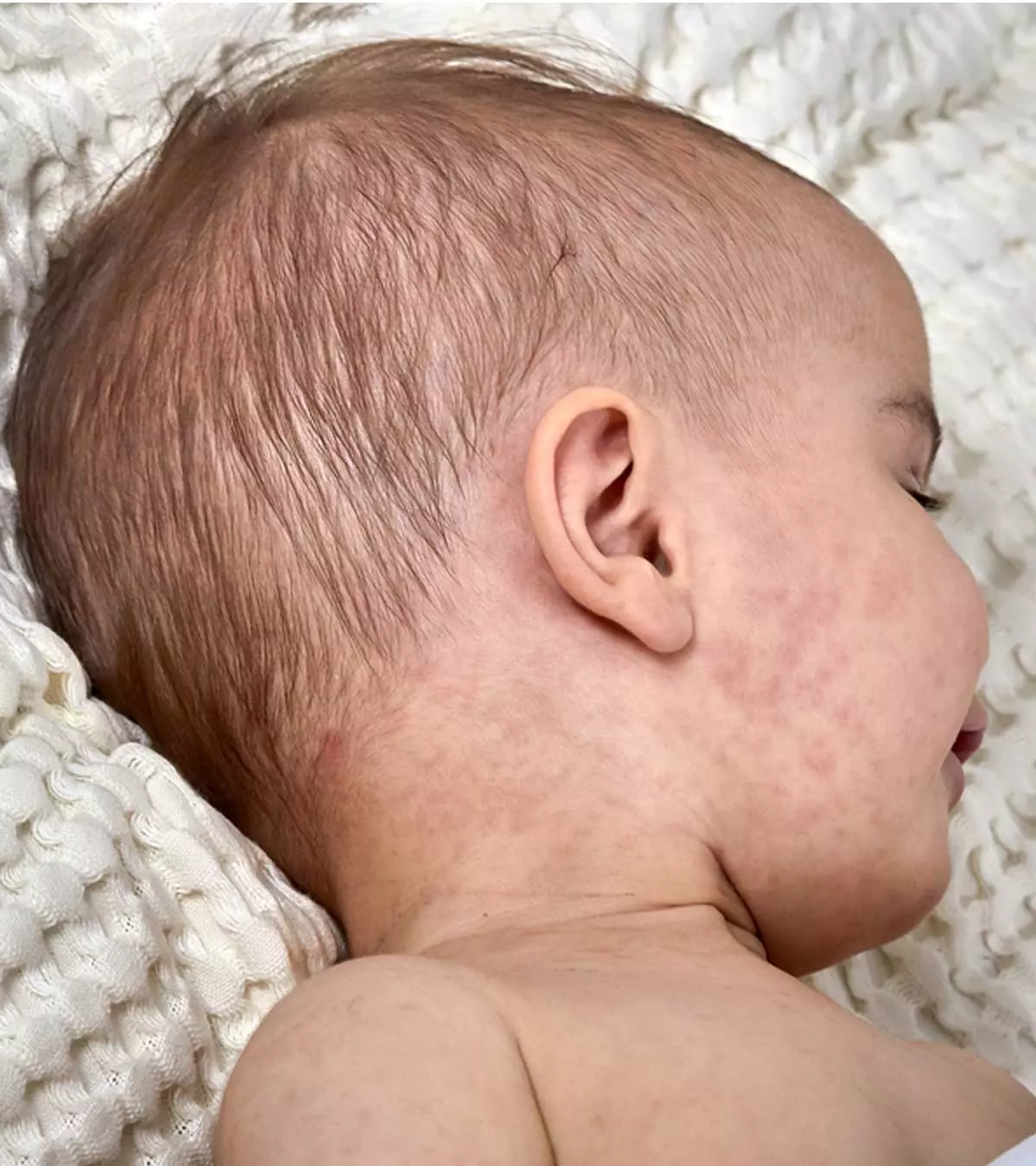
Image: Shutterstock
Most pregnant women experience various side effects, such as itchy skin, increased sweating, fatigue, and body odor, among others. However, these vary from one woman to another as each pregnancy is unique. This post takes you through the condition, increased body odor during pregnancy, its causes, and treatment management. It is likely to cause discomfort, especially in the first trimester when coping with nausea and vomiting (morning sickness). While many women notice these changes, understanding the causes and remedies can help ease concerns and support comfort and confidence throughout pregnancy.

Key Pointers
- Pregnant women may sweat more due to hormonal changes.
- Certain dietary changes, vaginal odor, and a heightened sense of smell during pregnancy can lead to the detection of body odor.
- To reduce body odor during pregnancy, bathe twice daily using mild soap, keep armpit and pubic hair trimmed, and wear clothing made from natural fibers.
- Drinking ample water and fluids can also help reduce body odor during pregnancy.
- If you experience a sudden increase in sweating or a drastic change in body odor during pregnancy, consult your doctor.
What Are The Causes Of Body Odor During Pregnancy?
Body odor is believed to be normal during pregnancy. For example, Keilani, a mother, shares her experience of body odor during pregnancy on her vlogs. She says, “In regards to body odor, I want to say that my armpits sweat so bad right now. I’ve to switch my deodorant twice, but I think I would have to use an exfoliant (i).” Some possible causes of increased body odor in pregnancy are as follows:
1. Increased sweating

Due to the hormonal changes in pregnancy, there is an increased blood supply to the skin. It may make a woman feel warmer and cause increased sweating or perspiration (1).
Pregnancy hormones can cause night sweats in women. Night sweats are episodes described as drenching sleepwear and bedsheets that cause disturbed sleep, which does not occur due to an overheated sleep environment (2).
 Point to consider
Point to consider2. Heightened sense of smell
The increased hormones in pregnancy may impact the heightened sense of smell, making a woman more conscious about her body odor (3).
3. Dietary changes
Some pregnant women may change their diet to ensure optimum nutrition, while others may indulge in binge eating due to pregnancy cravings. Meat, seafood, cruciferous vegetables, such as cauliflower, broccoli, cabbage, or other foods, including onion, garlic, asparagus, and kale, may lead to foul body odor (4).
 Did you know?
Did you know?4. Stress
Pregnant women often feel anxious or stressed, and this emotional strain can lead to changes in body odor. Stress-related sweat from the apocrine glands may be a contributing factor. A few studies show that psychological sweating, induced by emotions like stress, anxiety, and pain, is not limited to specific areas but can affect the entire body. Notably, this stress-induced sweating increases sweat production in the axillary region (armpit area) and contributes to malodor formation (5).
5. Vaginal odor

Pregnancy may lead to an unusual vaginal odor accompanying burning, itching, or brown/red discharge (6). If there is more than one symptom, the patient must see her doctor as soon as possible, as that may indicate a vaginal infection.
How Early To Expect Increased Body Odor?
The body odor may occur at any time during pregnancy, depending on the underlying cause. Increased olfactory response due to hormonal changes may cause odor in the first trimester. Increased blood supply may lead to an increased body odor in the second trimester or the third trimester. Weight gain may lead to an increased odor in the third trimester as the sweat may settle down in the skin folds and emit odor.
Body odor due to hormones, diet, vaginal discharge or secretion can happen any time throughout the pregnancy.
How To Manage Body Odor During Pregnancy?
The following measures can help limit unusual or malodorous body scents during pregnancy. However, these measures may not resolve the problem from the grassroots level (7).
- Bath twice a day using a mild soap
- Trim your hair in the armpits and around the genitals to help prevent body odor and bacterial growth.
- Stay hydrated as it helps in flushing out the toxins of the body.

- Wear the right clothing made from natural fibers such as cotton, wool, or silk, as they allow the skin to breathe, reducing body temperature and sweating.
- Avoid eating smelly foods such as onion, garlic, and seafood. Instead, eat more fruits and vegetables to give a less offensive odor.
- Maintain vaginal hygiene by washing with just water. It helps in maintaining pH levels and healthy bacteria in the vagina.
- Use natural, gentle, doctor-approved perfume, fragrance, deodorant, or antiperspirant to smell better. However, avoid using OTC agents during pregnancy to avoid any adverse effects on the fetus. You can also use baby wipes to wipe off the sweat from the armpits, under the breasts, and the bikini area to minimize the stink.
- To reduce emotional stress and its effect on body odor, you may engage in de-stressing activities such as deep breathing, meditation, and gentle exercises such as yoga. Staying active promotes healthy circulation and sweating, helping to regulate body temperature. Additionally, spending time with friends and family and getting enough rest can promote a sense of calm and relaxation.
 Quick tip
Quick tipWhen To See A Doctor?

While sweating during pregnancy is not uncommon, the following symptoms may indicate the need to see a doctor (7).
- Sudden change in body odor
- Excessive sweating
- Finding the body odor intolerable
- Skin being continuously damp from sweating
- A rash or redness of the skin due to sweating
- A fruity or bleach-like body odor
Frequently Asked Questions
1. Can body odor predict a baby’s gender?
While there is no medical-based evidence to establish the belief, according to the old wives’ tales, you may experience more body odor with a boy than with a girl.
2. Is body odor an early sign of pregnancy?
Some women report experiencing a heightened sense of smell even before knowing they are pregnant (8). It may cause women to feel an increased body odor during the first trimester.
3. Is body odor during pregnancy a sign of a medical problem?
Body odor during pregnancy without any other symptoms is not a sign of medical problems. However, unusual symptoms, such as a fruity smell, may indicate health issues, including diabetes (7).
4. What foods can I eat to reduce body odor during pregnancy?
Anecdotal evidence suggests that eating leafy greens, citrus fruits, and fiber-rich foods may help reduce body odor.
5. Is body odor during pregnancy an indication of poor hygiene?
Body odor during pregnancy is usually hormone-related and not indicative of poor hygiene. However, maintaining proper hygiene may help you control its intensity.
Body odor is not a cause of concern unless some unusual symptoms accompany it during pregnancy. If your body odor is making you self-conscious or is causing embarrassment, consult your Ob/Gyn or a dermatologist to get a pregnancy-safe treatment. Body odor due to pregnancy is temporary and subsides after delivery in most women.
Infographic: Managing Body Odor By Cooling It Through Pranayam
Women may feel warmer during pregnancy due to changes in hormonal levels and increased blood flow. This can cause excessive sweating and body odor. Certain pranayama techniques can effectively calm and cool your body during this time and help decrease sweating, reducing body odor. Check out the infographic below to learn about these breathing techniques.
Some thing wrong with infographic shortcode. please verify shortcode syntax
Illustration: Body Odor During Pregnancy: Causes And Home Remedies

Image: Dall·E/MomJunction Design Team
During pregnancy, hormonal changes and increased sweat production might cause body odor. Watch this video to learn more about this phenomenon.
Personal Experience: Source
MomJunction articles include first-hand experiences to provide you with better insights through real-life narratives. Here are the sources of personal accounts referenced in this article.
i. ep1: mom things nobody talks about | being single and pregnant + body odor + missing out.https://www.youtube.com/watch?v=s_5EOavel6Y
References
- Common health problems in pregnancy.
https://www.nhs.uk/pregnancy/related-conditions/common-symptoms/common-health-problems/ - Night Sweats.
https://www.sweathelp.org/home/night-sweats.html - E. Leslie Cameron; (2014); Pregnancy and olfaction: a review.
https://www.ncbi.nlm.nih.gov/pmc/articles/PMC3915141/ - 5 foods and drinks that affect body odor.
https://wexnermedical.osu.edu/blog/5-foods-and-drinks-that-affect-body-odor - M. Harker; (2013); Psychological Sweating: A Systematic Review Focused on Aetiology and Cutaneous Response.
https://karger.com/spp/article-abstract/26/2/92/295722/Psychological-Sweating-A-Systematic-Review-Focused?redirectedFrom=fulltext - Vaginal Odor.
https://my.clevelandclinic.org/health/symptoms/17905-vaginal-odor - Sweating and Body Odor.
https://my.clevelandclinic.org/health/symptoms/17865-body-odor - Early signs of pregnancy.
https://www.pregnancybirthbaby.org.au/early-signs-of-pregnancy - Thyroid Disease & Pregnancy.
https://www.niddk.nih.gov/health-information/endocrine-diseases/pregnancy-thyroid-disease - Choline.
https://ods.od.nih.gov/factsheets/Choline-HealthProfessional/ - Andy He et al.; (2025); Benefits of Probiotic Yogurt Consumption on Maternal Health and Pregnancy Outcomes: A Systematic Review.
https://www.ncbi.nlm.nih.gov/pmc/articles/PMC7449615/
Community Experiences
Join the conversation and become a part of our nurturing community! Share your stories, experiences, and insights to connect with fellow parents.
Read full bio of Dr. Karla S. Sanchez-Banos
Read full bio of Dr. Ritika Shah
Read full bio of Rebecca Malachi
Read full bio of Dr. Joyani Das

















